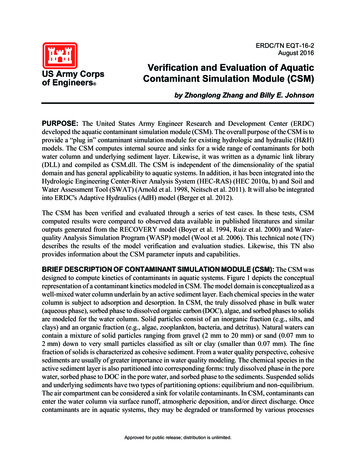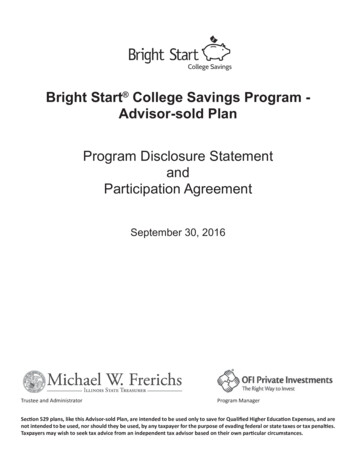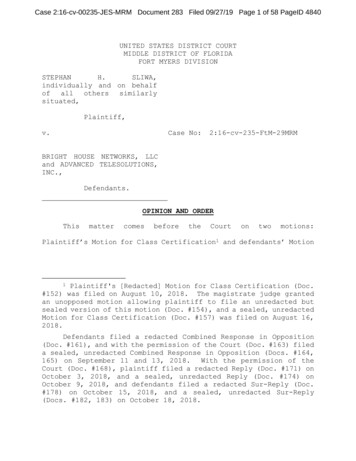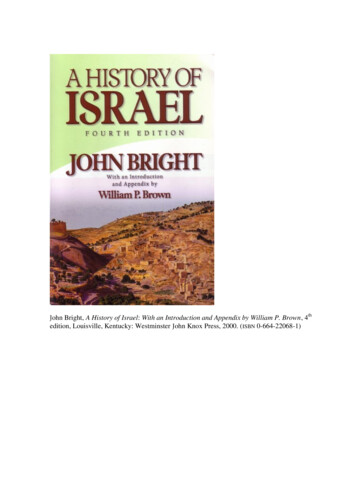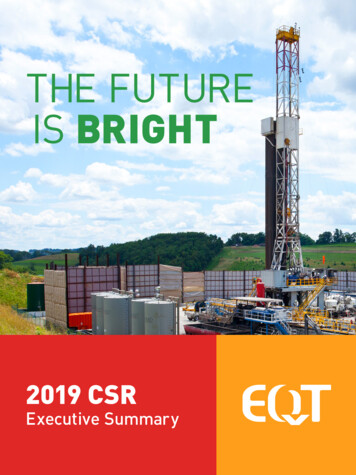
Transcription
THE FUTUREIS BRIGHT2019 CSRExecutive Summary
IntroductionDemonstrating EQT Corporation’s commitment to corporate responsibilityand transparency, we recently launched our eighth annual corporate socialresponsibility report, The Future is Bright. This year’s report is a testament toour focus on safety and operational accountability — all captured within the lensof our strategically implemented mission, vision and values.Our Values: Trust, Teamwork, Heart and EvolutionEnvironment andClimateEQT strives to operate safely, protect the environment and continuouslyimprove our practices in support of responsible natural gas production. Wecarefully monitor our air emissions, water, waste and energy use as well as ouroperational impact on biodiversity and ecosystems. Our Environment, Health andSafety Policy outlines our internal processes and guidelines for all employees tofollow to avoid harm to the environment.Climate and Greenhouse Gas (GHG) EmissionsCurrent legislative and regulatory measures to address climate change and GHGemissions are in various phases of discussion or implementation. EQT keepsabreast of these measures to remain compliant and understand how they mayaffect our operations.EQT completed the separation of our upstream and midstream businesses onNovember 12, 2018, with the spinoff of the standalone midstream company,Equitrans Midstream Corporation (NYSE: ETRN) (the spin-off). Following thespin-off, EQT became a premier pure play production company with a renewedfocus on upstream operations. At December 31, 2018, EQT held a retained19.9% equity stake in ETRN. All discussions in our report and this summaryreference EQT’s upstream activities and operations only, collectively disclosedas EQT or EQT Corporation, unless otherwise specified.To read about EQT’s management approach and 2018 performance for all topics,see our full online report, prepared in accordance with the Global ReportingInitiative (GRI) Standards – Core option, at https://csr.eqt.com.12019 CSREQT’s operational GHG air emissions depend greatly on the type and amountof field activity being conducted at any given time and vary on an annual basis.EQT is active in a number of partnerships seeking to reduce emissions in theoil and gas industry. In 2018, EQT joined the ONE Future Coalition, a group ofnatural gas companies working together to use a science-based approach toreduce methane emissions across the industry’s supply chain. We believe thatsuch targets should be meaningful to our investors and other stakeholders andalign with EQT’s long-term strategy. EQT also participates in The EnvironmentalPartnership, a group of U.S. oil and gas companies committed to improving theindustry’s environmental performance, and is a founding partner of the Center forResponsible Shale Development (CRSD), a nonprofit organization consisting ofenvironmental organizations and energy companies.Executive Summary2
EQT MethaneIntensity*YEARScope 1 Emissions* (Metric Tons CO2e)ONE Future Methane IntensityProduction Sector 002017*Methane Intensity is a calculation of methane emissions over natural gas throughput.EQT reduces and prevents methane emissions by:Preventing leaks during the design of wellpads by using pneumatic levelswitches and liquid level controllersCarbon dioxide (CO2) emissions2018Methane (CH4) emissionsNitrous oxide (N20) emissions*All data exclude midstream operations. 2018 data includes Rice Drilling B, LLC, and Rice Drilling D, LLC. EQT is potentially subjectto the methodologies for reporting GHG emissions under Subpart C (Stationary Fuel Combustion) and Subpart W (Petroleum andNatural Gas Systems) of the U.S. EPA Greenhouse Gas Reporting Program. Emissions are calculated utilizing U.S. EPA guidelinesunder 40 CFR Part 98 Subpart W.Leveraging a certified team of camera operators to perform Leak Detection &Repair (LDAR) surveys at all compressor stations, dehydration facilities, andunconventional wellpads with optical gas imaging (OGI) technologyMonitoring for leaks in real-time on unconventional wells and repairing allleaks within 15 daysUtilizing a green completions program to transfer natural gas after wellcompletion as opposed to flaring or ventingReducing methane emissions during well unloading by limiting ventingUtilizing glycol pumps that do not need natural gas pressure for power32019 CSRExecutive Summary4
WaterEQT is dedicated to protecting fresh water by operating responsibly; weminimize the quantity of fresh water used and mindfully select and carefullymanage the quality of water sources. EQT’s developed practices for effectivewater management include identifying and evaluating water sources, permittinglocations and operating withdrawal sites. We identify potential risks in eachrelevant category as well as appropriate mitigation, should the need arise.EQT takes our conservation responsibility seriously and cooperates with stateagencies to permit each water withdrawal site, which includes a full evaluationof watersheds and a recommended maximum flow rate. We adhere to agencyrecommendations on flow rates and do not exceed the maximum daily allowanceto protect the quality and quantity of each source. Surface water withdrawals aretaken in accordance with a state-approved water management plan ensuringthat we will not withdraw water from a stream during low flow conditions and thatadequate water remains in the water body for aquatic species and downstreamusers. Further, we strive to protect the fresh water in our communities byinvesting in new technology, leveraging industry best practices, reusing waterwhenever possible and disclosing the chemical makeup of our fracturing fluids.In 2018, we determined that none of our hydraulicfracturing sites deteriorated the surrounding groundor surface water quality compared to baseline testing.We strive to recycle wastewater generated from drilling, completions, andwell operations to minimize fresh water withdrawals, primarily through therecycling of water produced in our hydraulic fracturing process and from ourproduction process.52019 CSREQT tracks water withdrawals by source, whether or not any water sourcesare significantly affected by our operations and the quantity of water recycled.We maintain a set of best management practices for water, including digitaldashboards for monitoring performance against our operational Key PerformanceIndicators — such as environmental incidents — and a Production Control Centerto optimize schedules and monitor our assets in real time. We also leverageannual third-party environmental audits for a selection of operating facilities andsites. In 2018, we implemented a new procedure for EQT contractors to ensurecompliance with water withdrawal requirements, which includes a daily reviewand approval process prior to water withdrawal.Effluents and WasteEQT’s most prevalent by-products from the drilling process are wastewaterfrom hydraulic fracturing and solid wastes, such as drill mud and cuttings. Wepursue various strategies to recycle water and are committed to identifyingand employing safe waste disposal methods that reduce ecological impactand organizational costs. Additionally, to ensure the safety and health of ourworkers and communities and preserve the environment, we abide by policiesand procedures designed to minimize and mitigate liquid spills and releases.EQT enters into master service agreements with all contracted landfills to trackdisposed waste and periodically performs compliance inspections at thosefacilities.For our Appalachian Basin operations, EQT follows the Center for ResponsibleShale Development (CRSD) performance standards, including maximizing waterrecycling to decrease wastewater volume, safe wastewater disposal and effluentmonitoring. We recycle wastewater after the completion of a well by collectingflowback, drilling and produced water to reuse when fracturing new wells. Wedo not intentionally discharge any wastewater and did not hold any permits todischarge wastewater in 2018.Executive Summary6
In 2018, more than 90% of the wastewaterwe generated was recycled.EQT’s drill mud and cuttings are processed using solids control equipment thatefficiently separate drilling fluids from solids. EQT continues to improve theefficiency of its solids management program by using higher efficiency systemsthat create better separation of drilling fluid and drill cuttings, reducing the overallweight of the disposed product. While disposal methods for our solid waste vary,we seek the most efficient, responsible and cost-effective methods possible.Our priority is to reuse or recycle, but we also use landfills, deep well injectionor other approved methods when appropriate. In doing so, we comply with allregulatory requirements for the state or region, including de minimis thresholdsfor waste reporting.To reduce the likelihood and impact of significant spills, we maintain SpillPrevention, Control and Countermeasure (SPCC) plans for every worksite thatstores fluid. These comprehensive plans, based on regulation established by theUnited States Environmental Protection Agency (EPA), guide our employees andcontractors to minimize the chance for a release and dictate the actions requiredshould a spill occur. The plans define training programs, inspection protocols,secondary containment monitoring and repair programs required at each of ournatural gas wells and compressor stations.Biodiversity andEcosystem HealthAt year-end 2018, EQT owned or leased approximately 1.4 million gross acresprimarily in Pennsylvania, West Virginia and Ohio; consequently, land playsa huge role in EQT’s daily activities. Exploration and production activity havethe potential to impact the surrounding landscape, including areas with highbiodiversity value. EQT actively works to minimize our impact on the land andwildlife where we operate, both because it is the right thing to do and becausewe understand that our reputation depends on it. As a member of the MarcellusShale Coalition, we participate in working groups that focus on site planning,development, restoration and other topics that foster land protection.Once operations are complete at a site, we work with property owners to restoretheir land — as closely as possible — to its original condition. We reestablishcontours and revegetate with state-approved seed mixes, native seed mixesand/or vegetation requested by landowners. EQT works with landowners tosuccessfully accommodate their preference for returning their land to its preconstruction condition all while meeting the regulatory requirements set forth bystate and federal agencies. This enables us to maintain positive relationships withlandowners and communities and support biodiversity and habitat protection.We assess and monitor 100% of our business segment operations for biodiversityrisks. EQT follows federal, state and local regulations regarding species andhabitat protection during operational activity near protected land or areas of highbiodiversity. We do not directly drill for natural gas production purposes on legallyprotected lands in our owned or leased properties; these include wetlands, federallands and national parks. When drilling on land adjacent to protected areas, weleverage our horizontal drilling expertise to extract natural gas from undergroundwithout disturbing the surface or native species.72019 CSRExecutive Summary8
Air QualityFifth-Grade ClassHelps Save Playgroundfrom ErosionWhen McGuffey School District elementary students in Washington County, Pa.,noticed their playground and walking trail were shrinking into a nearby streamwithin the Chartiers Creek watershed, they decided to take action. In May 2018,38 fifth-grade students from Joe Walker Elementary School wrote letters tomultiple groups, including the Western Pennsylvania Conservancy (WPC), askingfor help to save their playground. Their efforts paid off, and the EQT Foundationawarded WPC a 55,000 grant to restore the streambanks that run alongside theplayground. Armed with maps and markers, students helped WPC watershed staffdesign the future planting of native trees and shrubs, which occurred in the fallafter the streambank had been re-graded.9Our operational emissions can affect local air quality in the areas where weoperate. EQT monitors our operational air emissions to comply with relevantregulations. Our Environmental Management System (EMS) collects data forevery station, calculates emissions based on monthly data and informs thecontinuous improvement of our processes and procedures.We strive to maintain 100% facility compliance with all permit requirements andemissions limitations, and we review any operational incidents and notices ofviolation. EQT utilizes inspections and audits to review compliance obligations andimprove our operations. Compliance personnel in each state inspect our work sitelocations regularly — including compressor stations, well pads and drilling sites —to evaluate air quality compliance. They also meet with state regulators to ensurewe are aligned with state air quality regulations and we conduct periodic leakdetection and repair.2019 CSR Executive Summary10
In the WorkplaceEQT relies on talent with a broad range of skills, as well as sophisticatedtechnology, to support the varying components of our operations. We aim toattract top talent from a variety of backgrounds and provide the tools and growthopportunities for our current employees to create a positive, effective andsupportive work environment while also returning home safely every day.Occupational Health and SafetyEQT places the highest priority on the safety of our workforce — both employeesand contractors — as well as the communities where we operate. We believeour operational excellence begins with our unwavering dedication to safety. Weclosely monitor our health and safety risks, operations and statistics to ensuresafe worksites, proper training and motivation to work safely.EQT’s safety management system (SMS) enables the company to systematicallyidentify and properly manage our workforce safety risk. It covers all aspects of thecompany, our employees and contractors, and all locations — from drilling rigsto offices. The EQT SMS includes the company’s EHS policy, workforce safetyinformation, awareness and training, safety procedures, performance monitoring,safety verification processes and qualified safety experts to lead the process.112019 CSRIn June 2018, we launched a new safety culture programfor our workers called ZiP Today, an acronym for “Zero isPossible — Today.” This program is emblematic of a safetyculture wherein the EQT workforce believes that each daypresents a new opportunity for them to take an active rolein living and working safely — in the field, in the office andat home — with zero safety incidents. The ZiP Today platform includes positiveworker safety recognition, sharing of lessons learned and take-home ZiP Todaysafety kits. In 2018, EQT sent two safety kits, including items such as safetyglasses, gloves, lip balms and hardhat stickers, directly to employeeoffice mailboxes.With contractors making up approximately 90% of EQT’s total work hours, werecognize the importance of working with companies committed to superior safetyperformance. A contractor expecting to perform services in drilling, construction,maintenance or other operations-related activities at EQT mustpass a qualification process and must agree to adhere to EQT’s Contractor SafetyStandard and Contractor Safe Work Rules. These safety requirements, updatedregularly to reflect best practices, apply to all work performed by a contractor’semployees and the employees of their subcontractors.Executive Summary12
Recordable Work-Related Injuries (per 200,000 hours worked)Technological mployeesNon-Employee Workers20172018EQT remains engaged with our contractors as work evolves to ensure weachieve our joint commitment to safety. We track contractor safety incident rates(injury and vehicle accidents) provided by contractors via ISNETWorld , andour contractor safety auditing process is incorporated in EQT’s contractor safetyqualification program.As safe driving remains a particular area of concern for EQT, we continued toenhance fleet safety initiatives in 2018, including mandatory employee safe drivertraining sessions and recurring contractor fleet safety meetings.In 2018, we revised our Safety Incident Reporting and Investigation Programrequirements. This standard provides tools and procedures for classifyingincidents and near misses; standardizes notification requirements and actiontimelines for incidents and near misses; and ensures an appropriate investigationis conducted based on the severity of each incident. Additionally, EQT updatedits suite of safety management programs to ensure ongoing continuousimprovement.132019 CSREQT’s commitment to innovation allows us to reduce resource use and maintaincost- and time-saving efficiencies across our business, from construction toproduction and water management. We strongly encourage innovation throughoutthe organization as it is fundamental to every aspect of our business. Throughoutthe past two years, our investments in Real-Time Operations Centers (RTOCs)have built upon our existing systems that transmit data from field locations tooffice personnel to optimize our operations. Centralized teams and in-house,real-time data review have enabled teams to realize efficiencies by focusing onproactive decisions and preventative maintenance while minimizing the need forcostly reactive measures. During 2018, our operational teams made substantialprogress in the development of three centers: drilling, completions andproduction/water operations.In 2018, EQT’s internal innovation group piloted a new idea-sharing platformduring a targeted campaign focused on artificial intelligence. This group alsolaunched an internal digital collaboration tool to collect general ideas. Several ofthe ideas submitted were explored and shared with the business units for furtherassessment and implementation. Additionally, EQT’s external innovation groupevaluated 151 new technologies mainly focused on completions, productionoperations, drilling, water management, construction and design engineering.During this time, they initiated 11 pilot projects and ultimately incorporated threenew technologies into our operations.Executive Summary14
In the CommunityAt EQT, we strive to work in harmony with the communities where we operatethrough our values of trust, teamwork, heart and evolution. We understand thatour license to operate is rooted in our relationships with communities, especiallywhen it comes to safety and other concerns. To safeguard local communities’well-being in alignment with our operational needs, we have established channelsto discuss and address concerns, engage in political activity, donate funding andresources, and educate community members on various aspects of our business.Through these engagements, we develop strong relationships that benefit bothEQT and our communities.Local CommunitiesEQT values the communities where we operate, and we focus on three areasto support and engage with them: managing our impacts, various forms ofinvestment and being a good community citizen. As EQT strives to operateresponsibly, we work to build trust by sharing information associated withour current, planned and proposed operations. Through public engagement,education, corporate giving and volunteering, we are better able to continueoperating as a responsible natural gas producer.Increased truck traffic, road impacts, noise, dust, lights and 24/7 operationsassociated with the construction of wellpads, active drilling and the completionof wells are examples of concerns among local communities in our operatingarea. Prior to construction, EQT’s Land Department engages with surface ownerswhere a site is planned to ensure mutual agreement on its location.152019 CSRTo better understand these concerns, regionally based EQT employees establishand maintain relationships with civic organizations, elected officials, emergencyresponse personnel, business owners, residents and other local stakeholders. In2018, these specialists worked closely with EQT’s Land, Permitting, Constructionand Legal Departments, among others, to report concerns and engagementoutcomes. We use our awareness of community concerns to establish policiesand procedures designed to minimize or eliminate many operational issues beforethey become disputes.EQT and the EQT Foundation — a separate 501(c)(3) organization — supportcommunities through local giving, sponsorship and philanthropic efforts.Charitable contributions from both EQT and the EQT Foundation are restricted toorganizations primarily within those communities near EQT’s active operations.EQT donations support a variety of organizations ranging from small localnonprofits to municipalities seeking additional support for community projectsthat exceed their budgets. Other types of corporate support include sponsorshipsof county fairs, community festivals and other local events. Our support enablesEQT to bond with our neighbors, enhance the quality of life for residents, educateresidents about our company and industry, and provide an opportunity for ourfellow community members to meet EQT employees.Executive Summary16
Public Safety andEmergency PreparednessGiving Back inBig Ways on #GivingTuesday#GivingTuesday, celebrated the Tuesday after Thanksgiving in the U.S., is aglobal day of giving fueled by the power of social media and collaboration.In 2018, EQT and the EQT Foundation joined the movement by creating afull-day of service and philanthropic activities in our communities. EQTvolunteered in the office and community, hand delivered checks to localnonprofits and municipalities, and donated a repurposed ice cream truck to alocal food bank. The EQT Foundation matched qualifying charitable contributionsmade by EQT employees on a two-for-one basis. The company took to socialmedia (Facebook, Twitter and LinkedIn) using the hashtags #EQTGivesBack and#GivingTuesday to generate interest and encouraged employees to do the same.In total, EQT Foundation granted more than 269,000 to nonprofits throughits two-for-one matching contributions. Additionally, EQT donated 25,500 to localnonprofits and municipalities. Nearly 50 employees participated involunteer programs.EQT’s corporate giving, sponsorships and road andinfrastructure improvements for communities totaledmore than 11 million in 2018, while EQT Foundationprovided nearly 8 million in grants and contributions.17The safety of the communities where we operate, and that of EQT’s employeeand contractor workforce, is a top priority for the company. Our communities relyon safe, responsible operation of wellpads, employee safety training and regularcommunications to minimize safety incidents. EQT’s emergency managementefforts focus on prevention, preparedness and response. We provide safetyawareness and emergency response protocols for communities, establish welldesigns and processes that prioritize safety, manage traffic and provide safedriver training.Operating units develop site-specific emergency action and response plans toprepare for significant risks. Before daily field operations begin, each team mustfocus on hazard prevention and prepare for an emergency situation by leadinga tailgate safety meeting. EQT’s Crisis Management team conducts annualdrills to prepare for a range of scenarios that may affect the company. EQT alsocontracts with experts to provide immediate support in such areas as well control,firefighting and spill response.We uphold community safety as a priority by regularly communicating with ourcommunities to increase awareness of our activities and address potential safetyconcerns. We work closely with emergency response personnel, public worksemployees, elected officials and other key community members to engage them inthe process, provide factual information, learn from them and build relationships.Through these interactions, EQT and our communities are better prepared tojointly respond in the event safety-related incidents occur.2019 CSR Executive Summary18
A common local community concern is the impact of increased vehicle traffic onmunicipal roads from our operations vehicles. Over the years, we establishedroutines and trainings to mitigate these concerns and reduce safety incidents.When designing construction routes to job sites, we carefully consider thelocations of schools, recreation areas and local population. Vehicle safety isincluded in both our employee and contractor safety expectations, and ourContractor Safe Work Rules include a section on safe vehicle operation. Atestablished Marcellus and Utica job sites, we develop a mandated Traffic ControlPlan, which we distribute to employees, contractors and subcontractors. Theseplans outline our specified speed limits, curfews and route restrictions. EQTacts to limit vehicle-related accidents by requiring employees assigned to acompany vehicle to complete a comprehensive set of driver training programs andprocedures regarding potential hazards and how to avoid them.Indirect Economic ImpactsEQT’s operations have a significant influence on the local economies wherewe operate by supporting economic growth via job creation and tax revenuegeneration. Intentional management of our positive impacts enables us tobuild strong relationships with our communities and lessen the United States’reliance on foreign energy. According to an analysis conducted by sustainabilityconsultancy ERM, EQT provided 4.66 billion in value-added contributions to theU.S. Gross Domestic Product (GDP). Our direct activities produced approximately 2 billion of GDP, and the indirect GDP impact through our suppliers was 643million. Our total induced impact — that is, the impact of spending by EQTemployees, contractors and suppliers — was approximately 2 billion.EQT Economic Impact ( Millions)100%90% 4,563 4,436 4,661 706 670 64380%70%60% 1,403 1,877 2,00250%40%30%20%10% 2,363 1,980 2,0160%20162016InducedDirect2016IndirectWe also generate revenue for the communities and states where we live andwork through job and wealth creation. Our operations — all in the U.S. — supportlocal economies via taxes paid, road infrastructure improvements, local hiringof personnel and through use and support of local service establishments. Wesupported approximately 23,000 ancillary jobs across our operations in 2018. In2018, EQT activities generated nearly 270 million in state and local tax revenues,supporting state and local governments.We spent 82.5% of our procurement budgeton suppliers physically located within EQT’soperational footprint in 2018.EQT also supports a strategic approach to seeking out small and diverse localsuppliers whenever possible. We consider diverse suppliers as those that areMinority Business Enterprises (MBE), Women’s Business Enterprises (WBE)and/or Veteran Owned Businesses (VOB). We identify these suppliers throughcollaboration with regional and national councils.192019 CSRExecutive Summary20
Political Involvementand Public PolicyEQT serves as an informed resource to U.S. policymakers on issues directlyaffecting the activities of EQT and those of the natural gas industry in general.This engagement supports fair and balanced laws and regulations that benefit allEQT stakeholders. Our political involvement and public policy activities are limitedto the United States. We engage with state and local politicians regarding issuesthat affect our operations and communities.We comply with laws and regulations in each jurisdiction where we are activepolitically. This includes federal and state campaign finance laws regardingpolitical spending in support of political parties, politicians and related institutions.We do not engage in political activity or make financial or in-kind contributions topolitical parties, politicians or related institutions outside the United States. Wefund our political spending through:Read the full Corporate SocialResponsibility Report online:https://csr.eqt.comEQT Employees Federal Political Action Committee (PAC), sourced solelyfrom the voluntary contributions of EQT employeesEQT Employees Pennsylvania State PAC, sourced from voluntary employeecontributions and transfers from the EQT Employees Federal PACEQT corporate treasury dollarsWe also work to support federal, state and local policies that promote stableinvestment climates for natural gas exploration, production, storage andtransportation. These may include policies governing environmental protection,taxes, natural gas production, transportation and expanding the use of natural gasin sectors such as transportation, manufacturing and electricity generation. Whenengaging with policymakers, we consider the impacts to EQT, our stakeholders,communities and the environment.212019 CSR Executive Summary22
eqt.com ConnEQTEQT Corporation (NYSE: EQT) is a Standard and Poor’s 400 investor-owned upstream energy corporation operatingin the United States of America. Founded in the Appalachian Basin and headquartered in Pittsburgh, EQT is proud tobe the largest natural gas producer in North America.As a leader in the use of advanced horizontal drilling technology, EQT is committed to minimizing the impact ofdrilling-related activities and reducing our overall environmental footprint. By operating safely and responsibly, EQT ishelping to meet our nation’s demand for clean-burning energy, while simultaneously offering a rewarding workplaceand support for activities that enrich the communities where our employees live and work.Please email inquiries regarding our Corporate Social Responsibility reports to Public
) emissions Methane (CH 4) emissions Nitrous oxide (N 2 *Methane Intensity is a calculation of methane emissions over natural gas throughput. 0) emissions 3 2019 CSR Executive Summary 4 YEAR EQT Methane Intensity* 2017 2018 0.1 0.0 ONE Future Methane Intensity Production Sector Target 0.28% Scope 1 Emissions* (Metric Tons CO 2 e)


